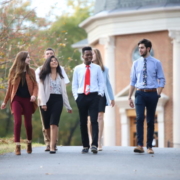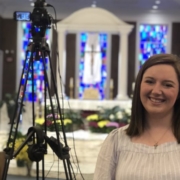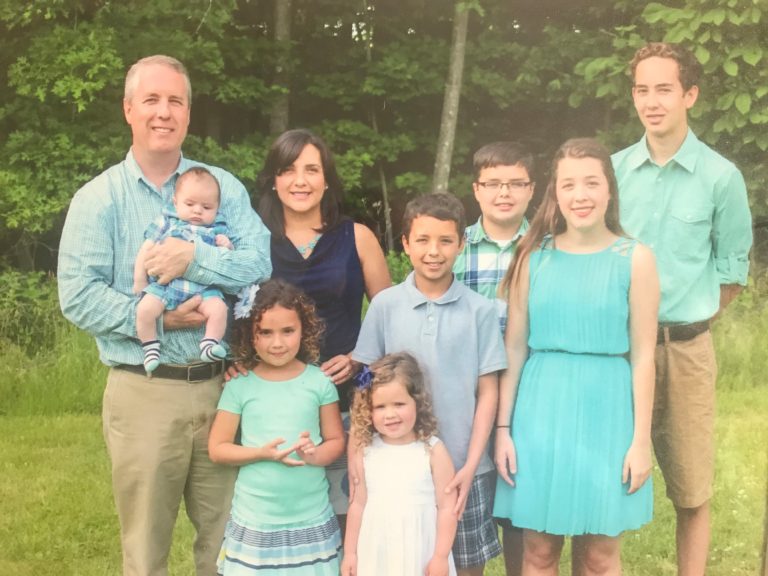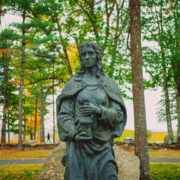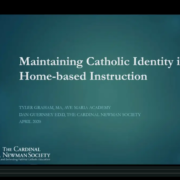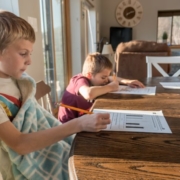Christendom College ‘More in Demand Than Ever,’ Says Enrollment VP
While six in ten colleges missed fall enrollment goals in 2019, Christendom College in Front Royal, Va., which is recommended in The Newman Guide, is thriving. Not only has it grown 30 percent over the past six years, but it is also setting a standard for fidelity in Catholic higher education.
Even in these uncertain times due to the COVID-19 pandemic, the college is currently poised to meet or exceed its enrollment goals for Fall 2020 – a true testament to the value of its offerings at this unique time in our history.
Christendom College is committed to strong Catholic identity in academics, student life, and across campus. As a result, graduates of the college are “faithful and articulate Catholics who are not afraid to stand up for the truth,” according to Tom McFadden, vice president for enrollment at the College.
The Newman Society recently asked McFadden to discuss what makes Christendom unique, and about recent events at the college, including the progress on the new Christ the King Chapel.
Newman Society: Christendom College was founded more than 40 years ago to counter harmful trends in Catholic higher education. Today, the College sets a standard for fidelity and strong Catholic education. What makes Christendom such an exciting choice for Catholic families?
Tom McFadden: We have all seen the culture continue down a rapidly more secular path, especially in recent years. Catholic families are understandably worried about how their children will continue to learn the truth and live the faith today, especially during the college years. Our institutions of higher learning, even “Catholic” ones, are becoming places where students are falling away from the faith, rather than growing in it.
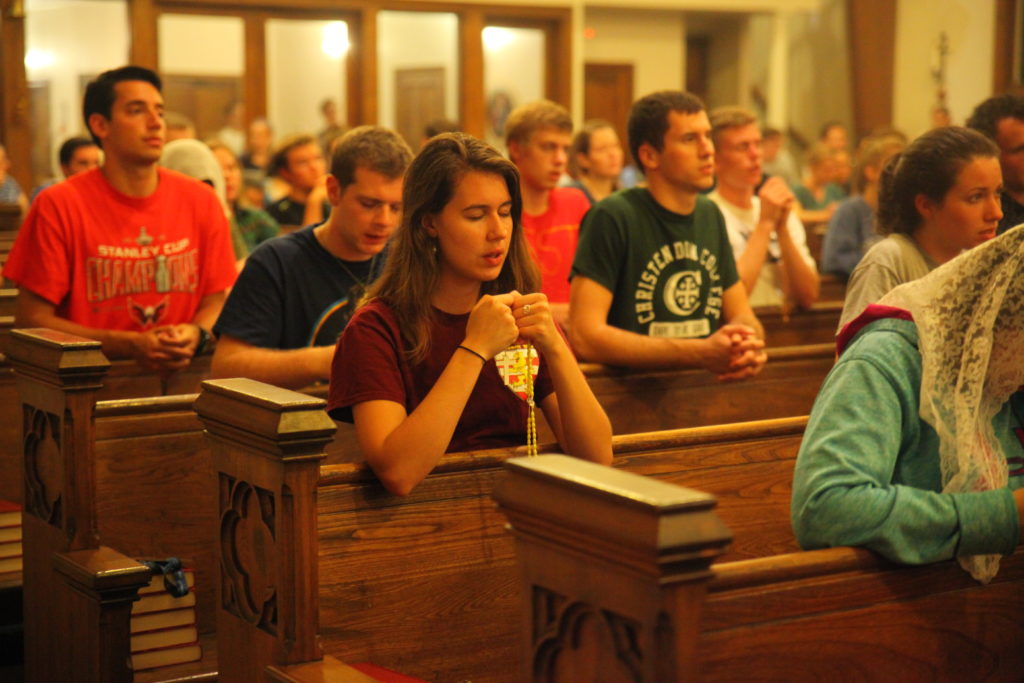
Christendom offers a solution for these families: a fully Catholic liberal arts education, taught by faithful Catholic professors from a Catholic worldview, in an authentic Catholic environment for the purpose of sending the graduates out into the world to make it more Christ-like. We are preparing the next generation of truly Catholic leaders who are not afraid to get off the sidelines and get involved in the great moral, spiritual, academic, philosophical and cultural battles that are coming our way – and families want their children to be prepared to handle these problems in the future.
Over the past 42 years, our alumni continually tell us the same thing, over and over again: they left Christendom with a top-rated academic education; were given the tools to think critically, innovate and communicate clearly; and embraced the knowledge and love of the faith that has enabled them to not only help themselves thrive as Catholics, but to help others discover the truth as well.
Our mission of “restoring all things in Christ” is not some hyped slogan, but a reality. With 96-98 percent of our alumni still practicing the faith, and 91 priests and 52 sisters counted amongst our alumni ranks, and with close to 500 alumnus-alumna marriages over the past 42 years, we are most certainly fulfilling our mission in the world!
As the recently retired Archbishop Chaput of Philadelphia said of us, “Christendom College is not just a superior academic institution. It forms young men and women into real Christian disciples, people of keen intellect, prudent judgment, deep Catholic culture and a zealous love of God and learning… No one can ask anything higher from higher education… The Church owes a hearty ‘thank you’ to everyone in the Christendom College community for their extraordinary witness of Christian humanism and unembarrassed, joyful dedication to living the Catholic faith.”
I think that the good Archbishop did a solid job of summarizing why so many families love sending their children to Christendom and why we set a standard for fidelity and strong Catholic education today!
Newman Society: How is the College preparing graduates to go out into the world and rebuild Christendom?
Tom McFadden: While students are here, they are studying the greatest thinkers of Western Civilization in an educational environment that encourages them to think critically about these subjects. From smaller classrooms that ensure personalized attention, to a distinct focus where Christ is at the center of all our learning, students are uniquely prepared to excel after graduation in a way unlike what they would receive in a specialized, narrow education at another college.
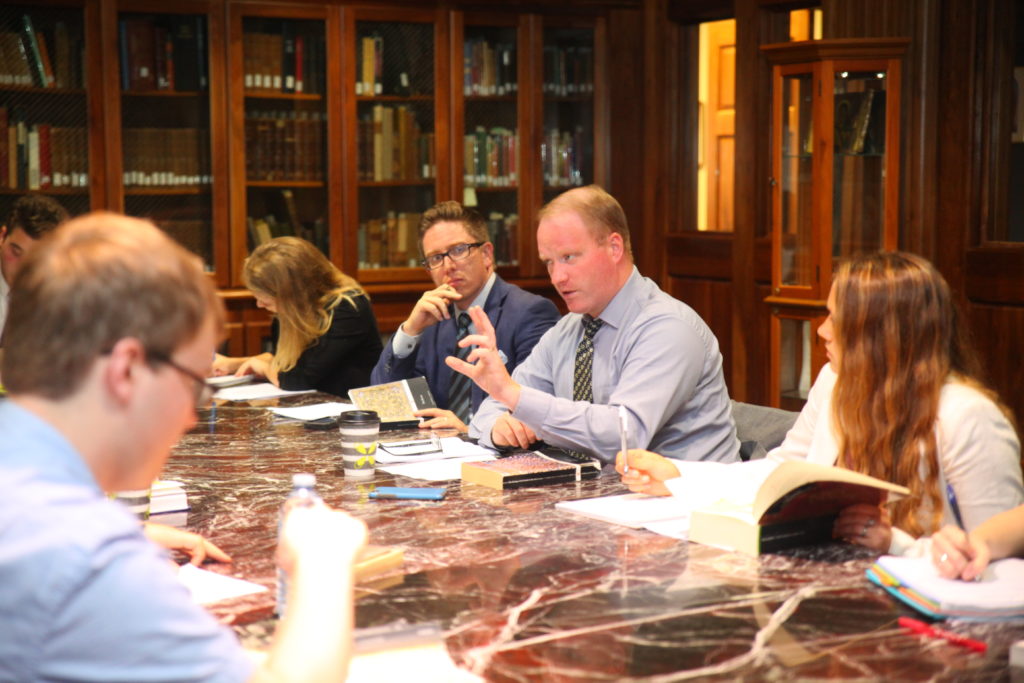
A Catholic liberal arts education gives students the full picture, ensuring they go into the world after graduation with the skills and knowledge necessary to truly bring Christ into their careers and to every person they encounter. Our founder, Dr. Warren H. Carroll, envisioned graduates going into every career field, armed with the knowledge, skills, and faith to rebuild Christendom. The world may be more secular than ever, but Christendom graduates are leaving with the Catholic, liberal arts background necessary to accomplish that mission.
Through our unique Education for Life career courses that are part of our core curriculum, as well as through our personalized career development offerings, our students are better prepared than most college graduates to enter any career field possible. They are smart, confident and, most importantly, faithful and articulate Catholics who are not afraid to stand up for the truth — no matter the consequences. They are living and working across the country and around the world, armed with the mantra “Truth Exists. The Incarnation Happened” – the watchwords of Christendom College. Although it has only been around for 42 years, and there are only around 4,000 people who have ever attended Christendom College, we are making a deep impact on the Church and the world.
Newman Society: Just recently, the College raised $45 million over two years for its Call to Greatness campaign, part of which included funds for the new Christ the King Chapel. Why did the College choose to embark on building this chapel, and why do you think you’re receiving such strong support for it?
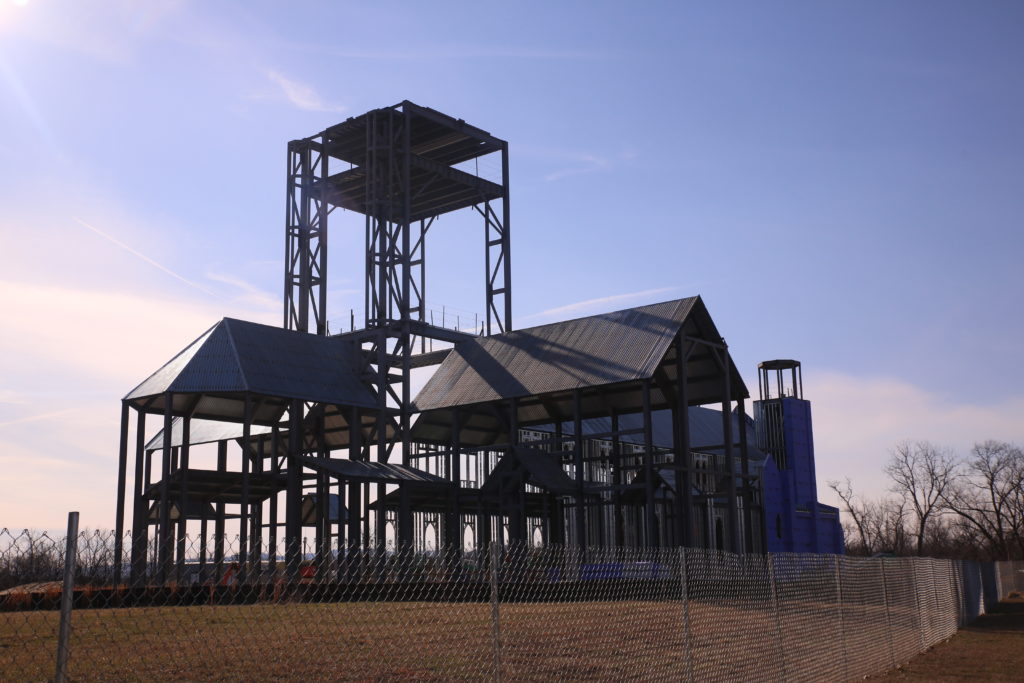
Tom McFadden: Practically speaking, our student body has grown exponentially in recent years, due to our education being more in demand than ever. Over the past six years, we have grown by 30 percent — when most colleges are fighting to either maintain enrollment levels or just keep their doors open — and as such, our need for a larger capacity chapel was self-evident. We currently have two Masses a day on campus, with more than two hours of confession available daily, and many in the local community also take advantage of our liturgical offerings. All of this has led to the building of the new chapel.
Another reason we believed we needed to build a new chapel is because today, in our current environment, the world needs outward signs of commitment to Christ and His Church. In medieval times, great cathedrals were constructed, raising people’s hearts and minds to Heaven. We wanted to bring that spirit back and inspire all who look upon this chapel to think on Christ, and to realize that in the end, He will reign as King.
Our donors are passionate about the need for such works of art today, and they see our new Christ the King Chapel as a true call to greatness. We’ve been so grateful for the outpouring of support we’ve received, and we look forward to celebrating the sacraments in this beautiful new chapel for generations to come. Their support is so crucial to our success since we do not accept any Federal funds — a sometimes difficult decision that we live with, but ultimately a prudent one, we believe.
Newman Society: This past fall, a Christendom freshman came into the Catholic Churchin the college’s chapel. How does the college help students go deeper in their faith?
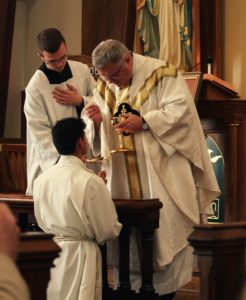
Tom McFadden: Freshman Charles Fuller’s story is an inspiration to all of us, but we’re also thankful to say that this is not the first time this has happened on campus. Since our founding, students have come to Christendom eager to learn more about the truths of the Catholic faith. Although the vast majority have entered as Catholic, we have had some non-Catholics attend who have converted to Catholicism, while the vast majority of our students end up falling deeper in love with Christ and His Church.
The college’s emphasis on the importance of the Catholic faith and its centrality to a life of virtue is paramount. Through the celebration of Mass twice daily; the recitation of communal prayers in the residence halls and chapel; the required courses in the fundamentals of the Faith, Old Testament, New Testament, moral theology, Catholic apologetics, plus all the many required courses in Catholic history and philosophy; the First Friday devotions, including all-night adoration; the availability of the Sacrament of Penance for more than two hours each day; the faith formation talks, groups and fellowship; the celebration of Catholic feast days as a community; the ringing of the bells throughout the day; the singing of the Salve Regina at the conclusion of college events; and the truly Catholic leadership of our college president, Dr. Timothy O’Donnell, the entire community remains focused on the prize and the pearl of great price.
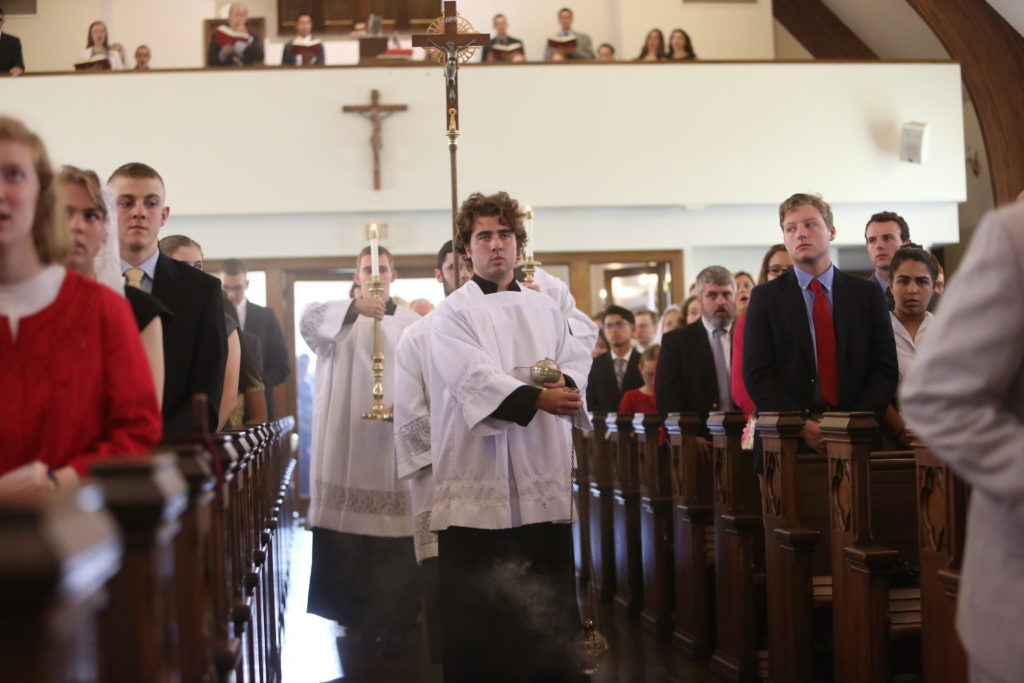
Through the liturgical offerings, academic courses, the great examples set by the faculty mentors and their families, the social activities that are uplifting and fun, and the vibrant community life on campus, the joy of the Catholic faith is visibly present.
As Greg and Toni Whittaker, who have sent 11 of their 12 children to Christendom, put it, “The most beneficial thing about a Christendom education is that our children can receive an academic and spiritual formation that is Catholic – it is the ‘pearl of great price’ that we as parents want to buy for our children. If you are going to put your money into higher education for your children, go for a good, solid investment like Christendom. At Christendom, your child will not have to compromise his faith, rather, he will be encouraged by the vibrant Catholic environment. Our children are now part of the solution to the cultural crisis that we see all around us as they build up a Catholic culture in America.”

